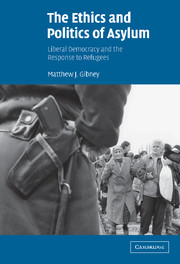Book contents
- Frontmatter
- Contents
- Acknowledgements
- Introduction
- 1 Partiality: community, citizenship and the defence of closure
- 2 Impartiality: freedom, equality and open borders
- 3 The Federal Republic of Germany: the rise and fall of a right to asylum
- 4 The United Kingdom: the value of asylum
- 5 The United States: the making and breaking of a refugee consensus
- 6 Australia: restricting asylum, resettling refugees
- 7 From ideal to non-ideal theory: reckoning with the state, politics and consequences
- 8 Liberal democratic states and ethically defensible asylum practices
- List of references
- Index
3 - The Federal Republic of Germany: the rise and fall of a right to asylum
Published online by Cambridge University Press: 22 September 2009
- Frontmatter
- Contents
- Acknowledgements
- Introduction
- 1 Partiality: community, citizenship and the defence of closure
- 2 Impartiality: freedom, equality and open borders
- 3 The Federal Republic of Germany: the rise and fall of a right to asylum
- 4 The United Kingdom: the value of asylum
- 5 The United States: the making and breaking of a refugee consensus
- 6 Australia: restricting asylum, resettling refugees
- 7 From ideal to non-ideal theory: reckoning with the state, politics and consequences
- 8 Liberal democratic states and ethically defensible asylum practices
- List of references
- Index
Summary
People persecuted on political grounds shall enjoy the right of asylum.
Basic Law of the Federal Republic of Germany 1949There is no way we can process people at this rate. With every day we are falling further behind.
Ulrich Kortmann, Cologne Refugee Centre 1992My responsibility as a politician is to optimise the conditions for the people who live here … It is not my duty to treat all problems in the world equally.
Edmund Stoiber, Interior Minister of Bavaria (CSU) 1990In Chapters 1 and 2, I considered the question of responses to refugees from the viewpoint of ethical (or ideal) theory. In the next chapters I want to look at the actual responses of four liberal democratic states towards refugees and asylum seekers. By examining the recent behaviour of these states it is possible to identify both the ways in which the practices of states depart from the requirements of ideal theory and the range of real-world factors that currently shape and constrain how liberal democratic states respond to refugees. These factors will need to be taken into account in my attempt to furnish practical prescriptions for state behaviour in the final two chapters of this work. My examination of the practical responses of states, however, will begin, in this chapter, with Germany. I will then move on to consider the cases of the United Kingdom, the United States and Australia.
- Type
- Chapter
- Information
- The Ethics and Politics of AsylumLiberal Democracy and the Response to Refugees, pp. 85 - 106Publisher: Cambridge University PressPrint publication year: 2004
- 1
- Cited by



